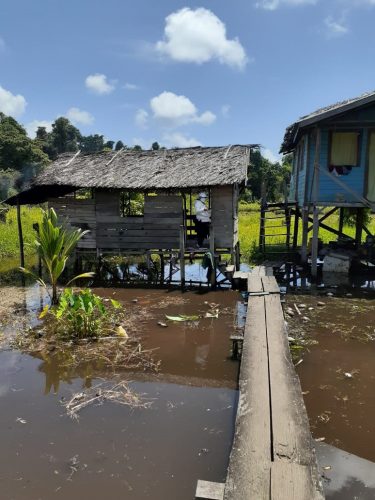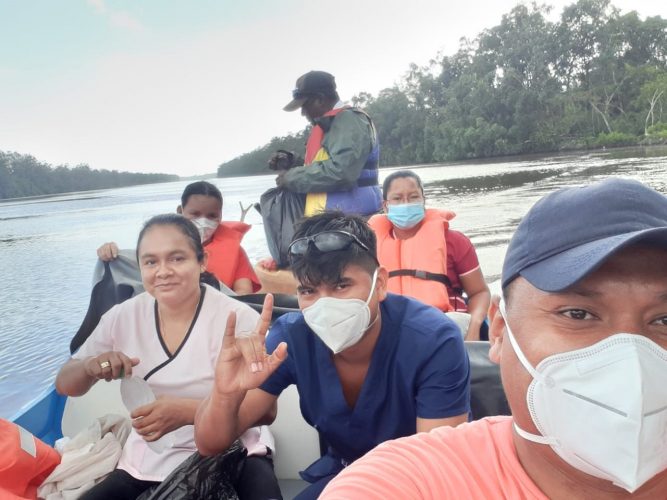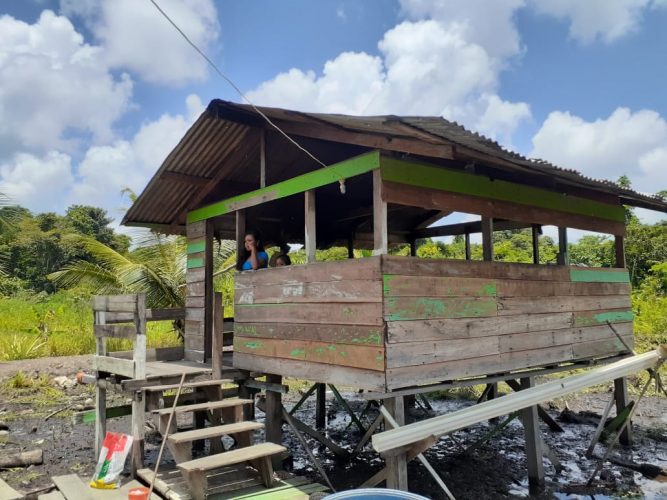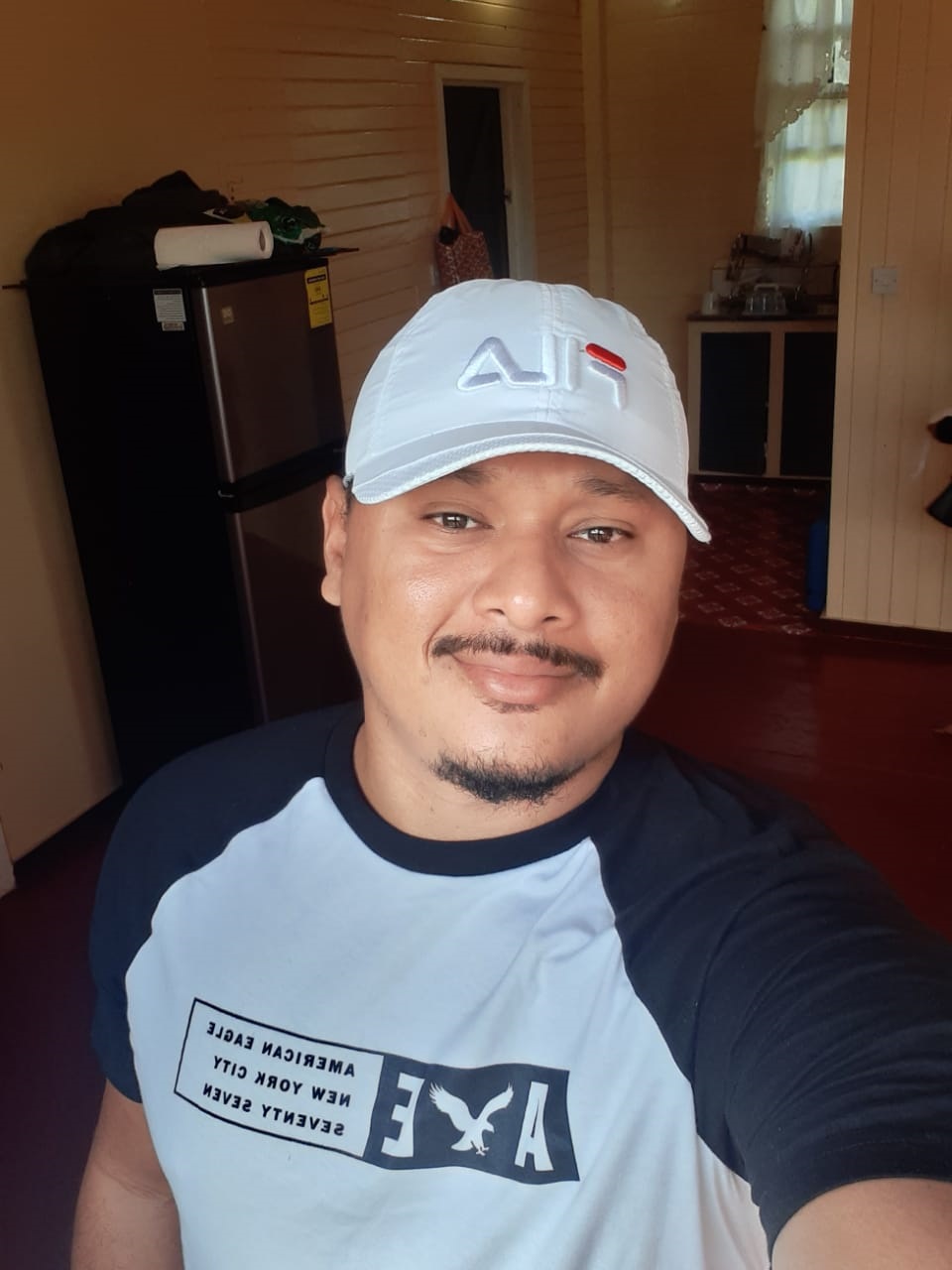He does not remember but his grandmother told him that he was three years old when he first announced that he wanted to be a doctor. Today, Dr Derron Moonsammy, 35, is serving in Region One (Barima/Waini), where he grew up, and while he has fulfilled his dream career, it has exposed him to the nightmarish existences of many in far-flung communities, which he is hoping to transform.
So moved was Dr Moonsammy by the fact that the 27 children in the small Unity Grant community were not attending school that he is now on a mission to make their schooling a reality. The children were forced to paddle for many miles to a school in Warapoka. But they had to leave at 5 am and would arrive at school around 10 am. They then had to leave at 1 pm to ensure they arrived back at their homes around 6 pm. This gave them only a three-hour school day and was so arduous for the young children that they all eventually dropped out.

The community where they live is home to about 44 families. None of them have electricity or potable water. Dr Moonsammy said the myriad issues they are faced with shocked him, and he is now on an urgent mission to assist the community, starting with the children.
Dr Moonsammy, who is the head doctor of the region and is stationed at the Kumaka District Hospital, said he first visited the community about two months ago. “I was shocked to find that they don’t have a school in the area. I didn’t have an idea about the area because we had a lot of difficulties to get to some of the areas… but now we have that [accessing communities] to an extent. To get to those areas I would have had to abandon the hospital and at one time I was the only doctor,” he said during an interview with Stabroek Weekend.
He only saw a few families as most of them were out farming with their children, but those he saw were malnourished and some of them had jaundice. The residents also told the health team about frequent outbreaks of vomiting and diarrhoea because their water supply is not wholesome for consumption. They have no toilets, so the rain washes their waste into the river from where they access water for drinking and catch fish.

“I felt disturbed by the revelations of the village leader. It is not something I would want for somebody growing up in Guyana, more so in my region. I think we should help them. I am sure persons… have helped them before, but it fell away, and they need help now… The most serious thing for me is the children not going to school. I know from working in other areas when children don’t go to school, they get pregnant early, they get into drugs and such like,” the concerned doctor said.
Dr Moonsammy said he was also disturbed by the sad story of the village leader’s son. The boy was just 16 and was working when a tree fell and hit him on the head. He sustained bleeding in the brain. The doctor said he had initially seen the child, but he had to transfer to the case to the Suddie Hospital, where it was discovered he had a hematoma in his brain. He returned to the village but suffered from frequent headaches and eventually took his own life.

“It was very disturbing because I remembered the child… but being far away they never returned to us, they passed and went straight back to the village… He was having a lot of headaches every day,” he said.
Hearing the sad ending of the young man’s life has driven Dr Moonsammy even more to helping the children access school. He wants to prevent others risking their lives at a young age to earn.
He said that with a 200 horsepower engine they got to the community in one hour and thirty minutes and in communication with its leader, the first thing he was told was that the children were not accessing any form of schooling.
“He said it was very tiring for the children to paddle for so many hours… He said they went for about two days and then they got tired on the third day and they stayed home. That continued over a period of time and the accumulation of absence saw them being removed from the register. That is what he told me. So, they never went back,” the doctor said.
Dr Moonsammy said it was unclear as to how long ago this occurred, but no one from the community attends school, nor is accessing any form of teaching. He hopes to get the children back into the school system so that they can access learning material. For the kindergarten children, he wants to be able to supply them with tablets equipped with learning apps so that can be taught. To the issue of the community not having access to electricity, he hopes to acquire some solar panels.
A boat and engine are also on the agenda to help the older children to get to the nearest school. And while schools are physically closed at present, at least they would be able to access the learning material being provided. He was told that a boat and engine were provided to the community in the past, but mismanagement might have contributed to the items no longer being available. Dr Moonsammy noted that in the interest of the children, there is a need for these essential items.
A challenge every day
Dr. Moonsammy has been serving as a doctor in Region One for the past five years and he said every day is a challenge.
He spoke about the difficult terrain that has to be covered to get to some communities and not being able to follow up with patients. Not receiving certain medication on time and being unable to do as many outreaches as he desires also weigh heavily on his mind. The doctor and his team have had accidents sometimes while attempting to access certain areas.
“Vehicles turned over with me and so on. I have had all these things and I know patients getting to us or us getting to them is very risky and some may not come so we have to try and make those visits. And then patients would come here [at the hospital] and we don’t have an x-ray machine and we have to send them further; we don’t have ultrasound machine and we have to send them further…,” the doctor said despondently, while adding that at times needed medication is not available.
“That is where the exhaustion comes in. That is where the frustration comes in and I kind of feel guilty sometimes even though it is not my fault. I feel kind of guilty that we can’t provide the services required and then especially when you hear the person might have passed away… Sometimes my doctors even cry…,” he continued.
He said sometimes he stays up late at night thinking about the plight of so many of his patients.
And with the unfortunate advent of COVID-19 the issues faced by the health team have doubled or even tripled.
“Every day there are so many things happening…,” the doctor said. When asked what keeps him going, he said at times he asks himself the same question. But he said there is sometimes that one patient who would go to him and say, ‘Doctor you are doing a good job’.
“I know I can’t help everyone, but I try. And I know that our services are needed so I have to keep going,” he said.
At present, there are four doctors in the region, but there was a time when Dr Moonsammy was the only one and he was on call every night. This continues even though he has been receiving much needed assistance from his colleagues.
His cell phone number is the COVID-19 hotline number and therefore he gets calls all through the day and night.
He also said many persons do not want to get tested and family members of those who test positive have threaten them. He shared that a family member of a deceased COVID-19 patient had reportedly identified four health workers, including him, to kill, but their trip to the community was delayed and the young man killed his cousin.
Dr Moonsammy said they were travelling to the community, but rain delayed them, and they arrived the day after the murder. It was then they were informed that they were the targets. He said at times they are scared. He often travels to communities on an ATV, and many of his staff members also make house visits, so he is concerned for their well-being.
“We had persons who blocked us from getting into their yards, getting into their village, some refuse testing… Every day we have to write reports… Some patients in isolation would want to get away; there are so many things going on, but we have to deal with them,” he said.
“Most persons don’t want to be tested. Most persons don’t want you to come into their yards. Most persons don’t want to hear about COVID-19, and they would bring up things about religion and so on. They think it is an evil thing and we are bringing it to give to them… There are many, many things to deal with when it comes to COVID-19 and once they see us some of them run away and hide…,” Dr Moonsammy shared.
However, he said little by little they are winning the residents over, though there are still small pockets of persons who don’t want to hear anything about the virus.
Dr Moonsammy is married with one daughter and initially he felt that because his wife is a nurse she would have understood the long hours he has to work.
“It is very difficult, you know. She would call and ask, ‘Why are you still at work…?’ I understand it is very frustrating. You want to spend time with your family. You want to go and do things together. I want to do things for myself, maybe go and play a sport, but I can’t do it because at that moment when I try to do something I get a call saying there is an emergency…,” he said.
He candidly revealed that his very demanding job has caused “a lot of quarrels” between him and his wife.
Dr Moonsammy was born and bred in the Mabaruma community and attended school there up to the secondary level before moving to Georgetown for sixth form at the Bishops’ High. Following sixth form, he went to the Business School where he wrote science subjects at CSEC as he was unable to do so at the secondary school in Mabaruma. He then taught for a year before accepting a scholarship to study medicine in Cuba.
He said while growing up he always loved science but even though he had access to a secondary school education in his community, he was unable to write subjects like biology and physics at that school.
If you are interested in assisting the residents of the Unity Grant community, Dr Moonsammy can be contacted on 687-8654.





